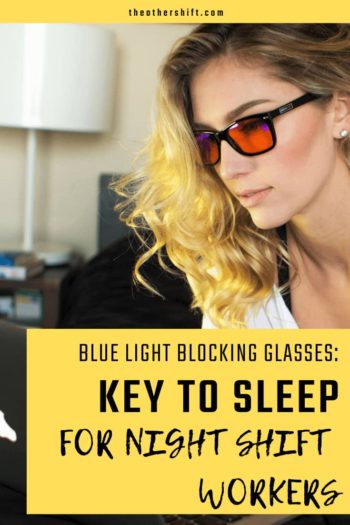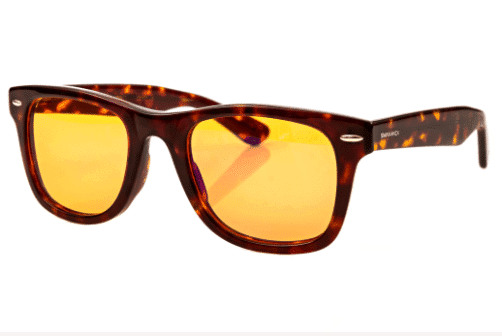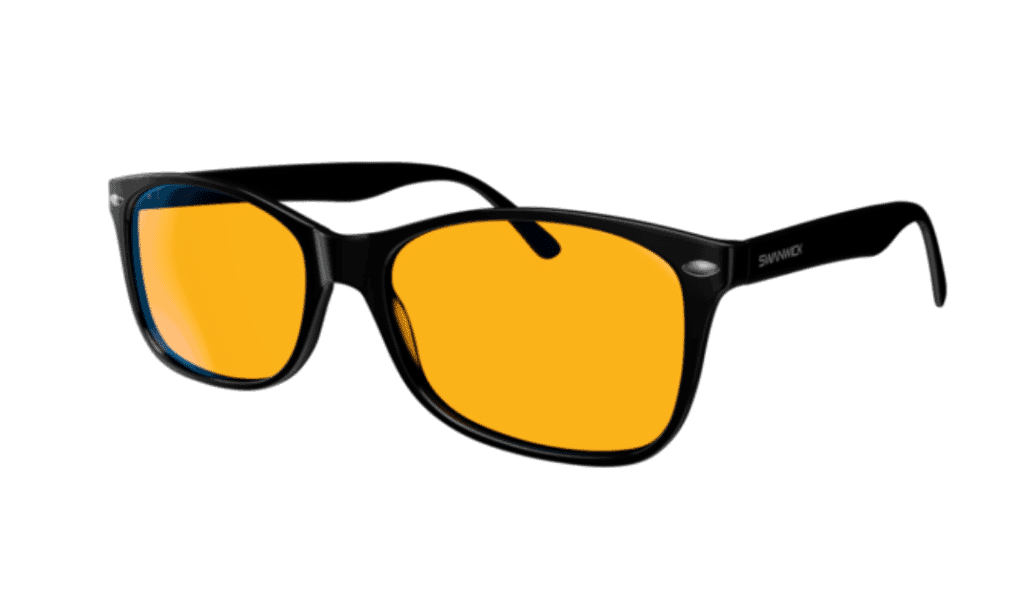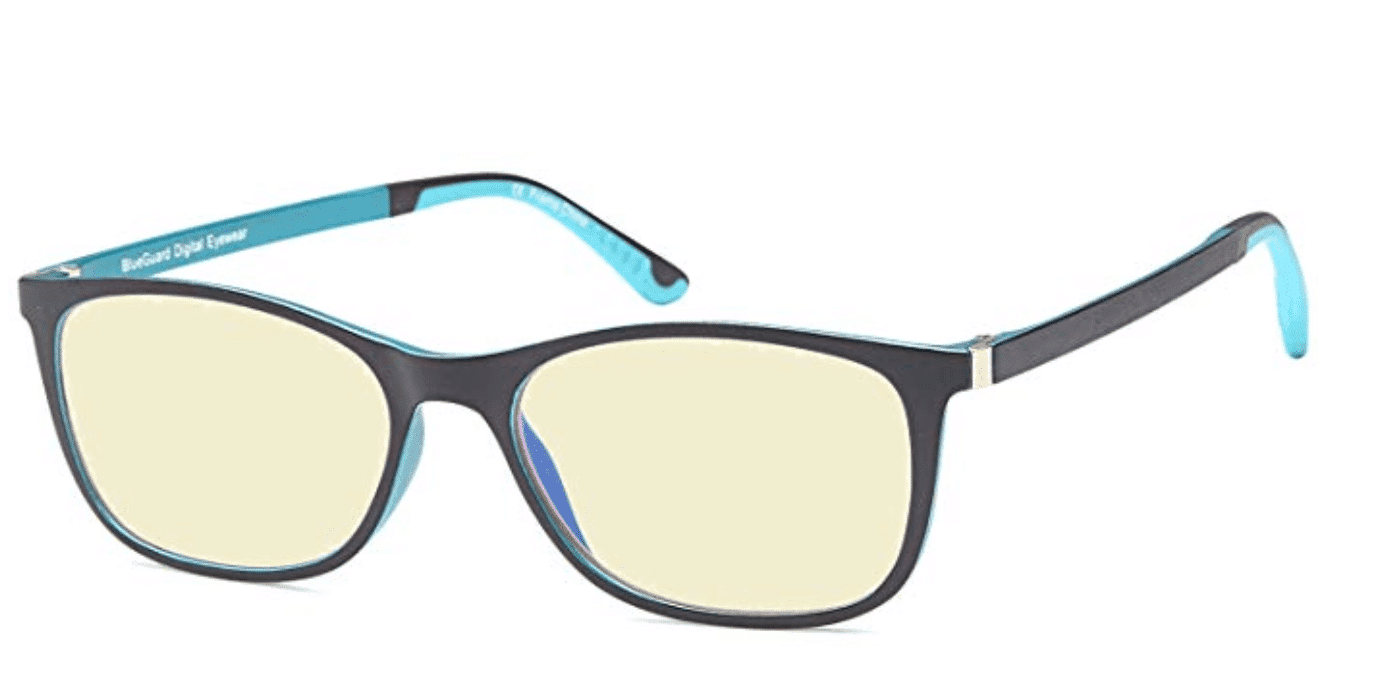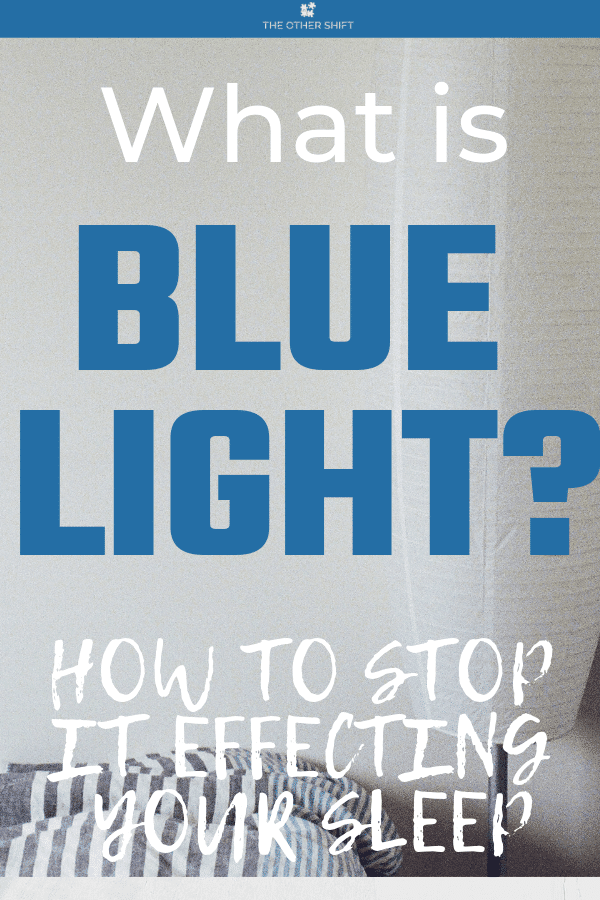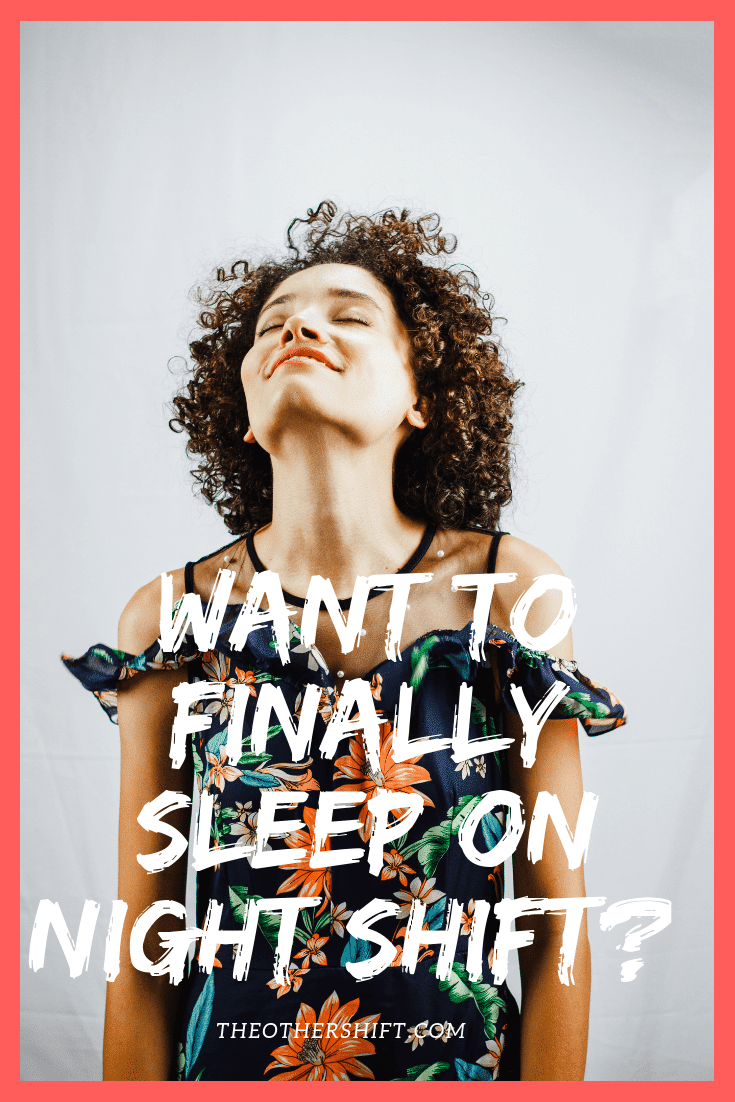Disclosure: This page may contain affiliate links, meaning we receive a commission if you decide to make a purchase through our links, but this is at no additional cost to you. Please read our disclosure and privacy statement for more info.
At first glance, those funny looking glasses with the orange lenses are almost laughable. However, blue light blocking glasses really do impact on the quality of shift workers lives. How many of you have struggled to sleep during the day? If so, let’s find out if investing in this type of eyewear is right for you.
Wearing blue light blocking glasses will significantly improve the quality of sleep experienced by night shift workers. These glasses allow people to continue using their device to wind down after a shift without disrupting important sleep hormones. Most experience incredible results within 1-2 weeks.
We personally experienced, unexpected, amazing results in the sleeping department when working both night and day shift. Throughout this post, we explore what blue light actually is and how these glasses work.
Introductory Note: Blue Light Blocking Glasses Terminology
You will often hear or read people talk about night shift glasses, computer glasses, blue blocker glasses, night shifter glasses and blue light blocking glasses.
But the thing is, they are all talking about the SAME thing…
Throughout this post, I am going to use the above language interchangeably to keep things interesting, but please be aware – I am talking about the same thing.
That is – orange-tinted glasses with special lenses which are blocking out blue light, keeping our sleep hormones in check. I’ll dive into this in more detail throughout the article.
For those of you new to this whole idea, they look like the glasses below from Swanwick Sleep – which is the exact pair Dan and I wear every night.
But there some seriously ugly pairs going around – doing a fraction of the job. #buyersbeware
If you’re already convinced, check them out HERE at Swanwick Sleep or read more via our shift work tools page here.

Now you know what I’m chatting about, let’s explore what blue light is and why it’s a problem affecting our sleep
What Is Blue Light?
Without getting too complicated, blue light basically comes from not only the sun, but also from our devices. Our laptop computers, phones, bedside lamps and even the light in your microwave!
Blue light is different from the other light rays you may have heard about such as red, orange, yellow and green.
How?
It carries a shorter wavelength and has more energy.
For those interested, blue light is generally defined as visible light ranging from 380 to 500 nm whereas red light, for example, is between 500-700nm.
What’s the big deal about these numbers?
These red light rays, such as the one heating up your pasta at the local eatery, emit longer wavelengths and, therefore, less energy = less dangerous.
But Is Blue Light Dangerous for Night Shift Workers?
The answer: yes and no
Let’s clear something important up – blue light is essential for good health
It boosts awareness, cognitive function, helps memory and is thought to improve our mood.
That’s why we rave about getting out in the sun when switching from night shift to day shift.
We need exposure to blue light to help remind our circadian rhythm about what time of day it is – particularly when working night shift.
Blue light assists the body’s natural wakefulness and sleep cycle.
BUT too much blue light before we sleep can stuff-up this intricate sleep cycle, leaving us feeling totally exhausted and utterly frustrated.
I like to think about the dangers of blue light in three parts.
- Increased risk of permanent damage to the retina and eye-related health conditions and blindness
- Effects of blue light on our sleep hormone melatonin making sleep incredibly difficult, particularly when working night shift.
- Contributes to digital eye strain leading to headaches, pain and discomfort making productive work almost impossible.
Let me explain each point a little more.
Our eyes, specifically the cornea and the lens (the parts in the front of your eye) are pretty great at blocking out UV rays from reaching the retina.
That’s the back section of our eye which is incredibly light-sensitive (often leading to people requiring cataracts if it’s damaged, when we forget to wear our sunglasses).
These UV rays I’m talking about are the visible light spectrum like the red and orange ones we touched on earlier.
[VIDEO] – What is blue light? If you got to this point and you’re feeling a little confused, here is a video to explain in more detail using cartoons.
However, basically, ALL of the blue light passes straight through these protective barriers hitting the retina.
And it doesn’t like it!
Research has shown that this damage, ‘causes changes that resemble those of macular degeneration, which can lead to permanent vision loss’.
In the few hours before bed, one of our important sleep hormones, Melatonin, doesn’t like blue light much either.
Why? It sends Melatonin loopy!
Our body ‘clock’ runs on a 24-hour cycle, commonly titled the ‘circadian rhythm,’ which I’m sure my nursing friends know all too well. Thanks, NCLEX.
It uses light and dark signals to tell your brain when it’s time to sleep and when to be awake.
A tiny pea-sized part of the brain called the pineal gland plays a big part in this process, by naturally producing the famous hormone Melatonin.
Melatonin starts to be naturally produced when it’s dark, generally around two hours before we get into bed.
The levels of melatonin then start to dissipate as we wake up.
Read more here about this process in a full review article we did about Swanwick Sleeps, blue light blocking glasses.
The bottom line here about blue light:
Is that the blue light we are so commonly exposed to through our devices, the TV and lights is not only keeping us awake but hurting our eyes. Potentially causing sleepless nights, daytime fatigue and putting as at an even higher risk of Shift Work Sleep Disorder (SWSD).
Ekk.
Related post: My Top Tip for Taking Melatonin on Night Shift: Plus 10 More

What Does This Mean for Night Shift Workers?
Shift workers add fuel to the fire, by already confusing the light and dark messages we are sending to the parts of the brain that regulate our sleep pattern!
Talk about confusion ya’ll!
Most day time workers experience a huge variation in temperature and light – which our body clock and Melatonin LOVE.
9-5 workers are awake when the suns out and they sleep when it’s dark – totally in-sync with their body clocks and the way we are programmed to live.
However, not for us night shift workers…
Those working the graveyard shift don’t have as much variation in these things.
We’re either sleeping or inside working, exposing ourselves to little if any, light during a 24-hour period.
We have all experienced that awful ‘jet lag,’ feeling while being on night shift or shortly after, right?
That’s your bodies response to the constant re-adjustment between night and day.
Fatigue and disorientation are common complaints around any 24-hour workplace and of course around the home.
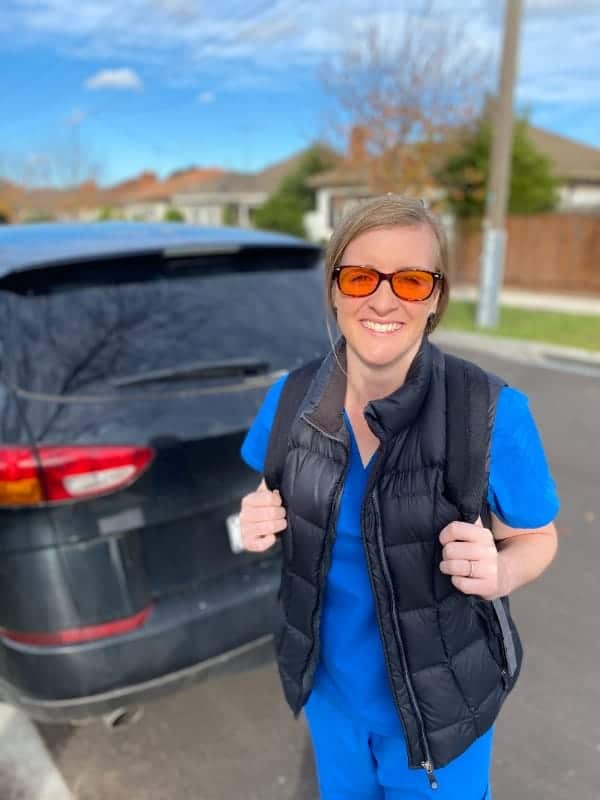
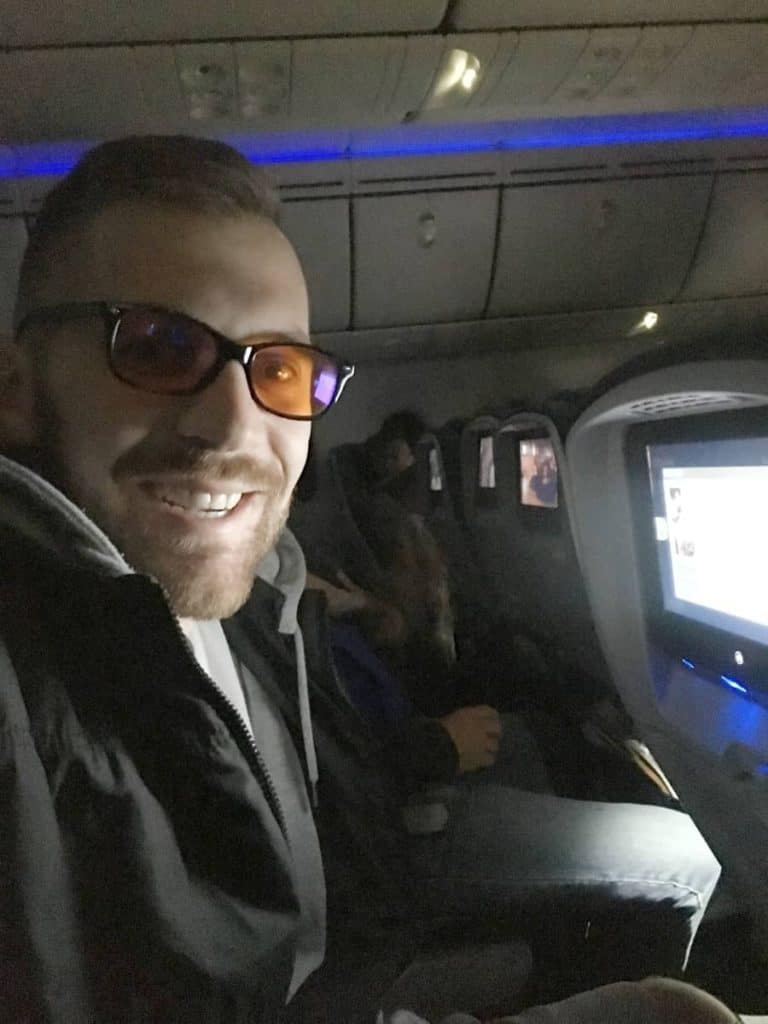
What Can Night Shift Workers Do About This Blue Light?
Wear blue light blocking glasses!
For us, they have totally changed:
- How quickly we are falling to sleep
- How well we sleep (aka – not waking up!)
- The length of time we are sleeping for
- How energetic and ‘un-groggy’ we feel, not only while working the graveyard shift but also on days off
Slide on your night shift glasses, immediately after finishing work right up until you turn off your light to sleep.
This includes wearing them while eating your breakfast, brushing your teeth and getting ready for bed.
Yes, of course, you can take them off in the shower, but turn down the lights and even consider using a candle to lessen that blue light we spoke about earlier and give yourself some love.
We have made wearing these glasses a permanent part of our routines, two hours before bedtime and it’s made a heck of a difference.
[VIDEO] – Our swanwick Sleep blue light blocking glasses review
How Does Blue Light Blocking Sunglasses Help Night Shift Workers?
To be honest with you, we thought it was a hoax in the beginning and simply a money-making exercise. Until we tried them…
As we said earlier, our eyes are not very good at filtering out the blue light coming from the sun and our phones.
The idea behind these night shift glasses is it does the filtering for us.
The eyes receives messages with an orange tint, which is calmer on the eye itself and importantly allows the body to produce Melatonin… AND prevents permanent eye damage.
Like all health products, the quality of what’s available varies massively.
Some block out only 50-70% of the blue light and are generally at a cheaper price point.
While others like Swanwick Sleep are a little more expensive, but they block out, ‘over 99% of blue light up to 490nm and over 98% up to 500nm‘.
When making our first purchase of blue light blocking glasses, I remember saying to my husband Dan who was working permanent night shift, ‘what’s the point of going to the effort to wear these cheaper glasses if they only bock 60%?
The choice is ultimately yours of course, but we want you to be informed so you can make the right choice for you and your eyes.
If you wondering whether your regular sunglasses do the trick?
The answer is no.
They will help with the frightening glare you first experience after night shift from the morning sun.
But they will not block nearly as much of the aggressive blue light as actual blue light blocking glasses.
Related post: How to Stop Falling Asleep While Driving after Night Shift
Our Blue Light Blocking Glasses Recommendations for Night Shift Workers
Best of the Bunch
Swanwick Sleep – Blue Light Blocking Glasses
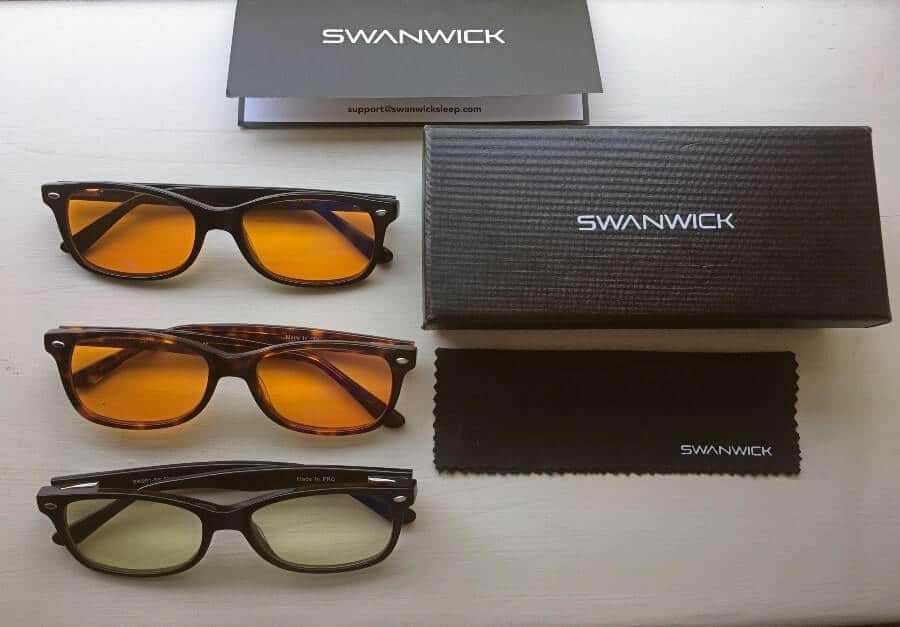
Night and Day Glasses 
These are the ones we use and recommend because:
- They block the MOST blue light out of any night shift glasses on the market
- Have a slick quality design your not embarrassed to wear
- Their customer service is second to none
- All glasses come with premium packaging, cleaning cloth and instructions for use
- Speedy delivery
Check them out here at the Swanwick Sleep website
Budget-friendly option
TRUST OPTICS FeatherView Classic Style Glasses
Just be aware they don’t block nearly as much blue light.
Check them out on Amazon here
Next…
- Naps: Should You Nap During Night Shift?
- Night shift tips: 7 Essential Night Shift Tips: Making The Impossible A Reality
- No sleep: 8 Useful Hacks for Surviving Night Shift With No Sleep
Summary: Do Night Shift Workers Need Blue Light Blocking Glasses?
Save your eyes from digital eye strain which could result in serious, permanent eye damage and potential photoreceptor damage, later in life.
Plus, lessen your risk of Shift Work Sleep Disorder (SWSD) and get the recommended 7-9 hours of sleep you deserve.
The whole staring at the ceiling thing for hours stops now.
Cheers,

Disclosure: This page may contain affiliate links, meaning we receive a commission if you decide to make a purchase through our links, but this is at no additional cost to you. Please read our disclosure and privacy statement for more info.

